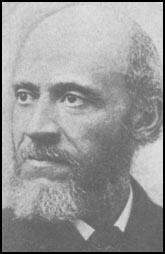Peter Humphries Clark

Peter Humphries Clark was born in Cincinnati in 1829. His father, Michael Clark, a barber, was the son of William Clark, the famous explorer. His mother was one of Clark's slaves.
In 1846 Clark became a teacher in a black school in Cincinnati. The job was poorly paid and in 1848 Clark became an apprentice in the print trade. However, the following year, his employer moved to California. The man who purchased the business refused to employ blacks and Clark was forced to become a grocery clerk.
After the death of his father in 1849, Clark took over his barbershop. He decided to break with local custom and run an "equal rights" shop, which would cater to both white and black men. This led to complaints from white customers and Clark decided to leave the profession.
Clark moved to New Orleans where he found work as a clerk. He held the job until 1852 when he became a school teacher in Cincinnati. The following year he was converted to Unitarianism. He also became involved in politics supporting the Radical Republicans opposed to Ulysses S. Grant.
In 1877 Clark began expressing Marxist opinions and switched his support to the Workingman's Party. However, by 1882 he had joined the Democratic Party. With the help of his son, Herbert Clark, he began publishing the Cincinnati Afro-American.
In 1886 his former Republican Party colleagues gained control of the Cincinnati School Board. Soon afterwards Clark was charged with political corruption. He was forced to resign as a school teacher and for a while sold textbooks. He later moved to Alabama where he became principal of the State Normal and Industrial School in Huntsville. In 1888 he obtained a position as a teacher in a black school in St. Louis. A post he held until his retirement in 1908.
Peter Humphries Clark died in 1925. He left his philosophy books to a St. Louis library. His large collection of poetry books by black poets were given to a Cincinnati library.
Primary Sources
(1) Peter Humphries Clark, speech at Dayton, Ohio, in 1873.
I do not forget the prejudice of the American people; I could not if I would. I am sore from sole to crown with its blows. It stood by the bedside of my mother when she bore me. It darkens with its shadow the grave of my mother and father. It has hindered every step I have taken in life. It poisons the food I eat, the water I drink and the air I breathe. It dims the sunshine of my days, and deepens the darkness of my nights. It hampers me in every relation of life, in business, in politics, in religion, as a father or as a husband. It haunts me walking or riding, waking or sleeping. It came to the altar with my bride and now that my children are attaining their majority, and are looking eagerly with their youthful eyes for a career, it stands by them and casts its infernal curse upon them. Hercules could have as easily forgotten the poisoned shirt which scorched his flesh, as I can forget the prejudices of the American people.
